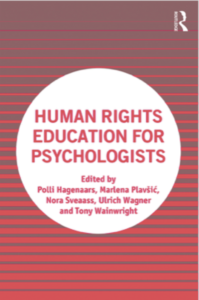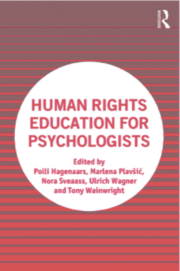
Human Rights Education for Psychologists
Edited by Polli Hagenaars, Marlena Plavšíć, Nora Sveass, Ulrich Wagner & Tony Wainwright; Foreword by Saths Cooper. Published by Routledge Press. Link to Publisher
Foreword: Psychology for human rights: Human Rights Education for Psychologists
By Saths Cooper
Preface by the editors: Human rights are for all
PART I: A human rights based-and-oriented psychology
Chapter 1: The Universal Declaration of Human Rights: foundations for a human rights based-and-oriented psychology
By Polli Hagenaars and Ava Thompson
Chapter 2: Human rights – How do they matter for the profession of psychology?
By Nora Sveaass and Michael Wessells
Chapter 3: Main human rights instruments and bodies, relevant for psychologists’ interventions
By Manfred Nowak and Anna Zenz,
Chapter 4: Human rights: cross-national and cross-cultural perspectives
By Rama Charan Tripathi
Chapter 5: Critical human rights-based approach to applied psychology: context and power
By Nimisha Patel
PART II: Psychology and social accountability
Chapter 6: Human rights and professional identity
By George Ulrich and Tony Wainwright
Chapter 7: Use and misuse of psychological science, knowledge and research
By Tony Wainwright and Giovanna Leone
Chapter 8: Playing together: children’s human rights and psychology
By Kerstin Söderström and Ragnhild Dybdahl
Chapter 9: Human rights in business and employment: promoting the right to decent work
By Kathleen Otto, Martin Mabunda Baluku, Ulrike Fasbender
Chapter 10: Social accountability and action orientation: strengthening the policy-making capacity of psychologists
By Elizabeth Lira
PART III: Human rights and professional practice
Chapter 11: Universal human rights – except for some
By Paul D’alton
Chapter 12: The Convention on the Rights of Persons with Disabilities and the challenge to treatment without consent of individuals with psychosocial disabilities
By Bernadette McSherry and Lisa Waddington
Chapter 13: Forced migration–psychological contributions that might help to improve the human rights situation
By Ulrich Wagner
Chapter 14: Indigenous groups facing environmental racism: human rights, resilience and resistance in Palestinian communities of the West Bank and the Mapuche of Chile
By Devin G. Atallah and Michael Ungar
Chapter 15: Torture and the role of the psychological profession
By Pau Pérez-Sales and Nora Sveaass
Chapter 16: Gender and war: Bosnian psychologists dealing with con!ict-related sexual violence during and after war
By Inger Skjelsbæk
PART IV: Human rights educational practice for psychologists
Chapter 17: Core competences for psychologists practising human rights-based approaches
By Marlena Plavšić, Tony Wainwright and Artemis Giotsa
Chapter 18: Planning human rights education for psychologists
By Felisa Tibbitts and Polli Hagenaars
Chapter 19: Stories of human rights–teaching and learning
By Sarah Butchard, Tommy Dunne, Hilda Engel and Artemis Giotsa
Postscript: Janel Gautier

